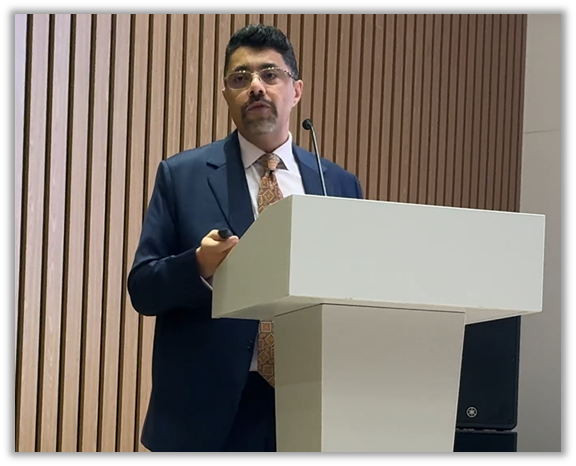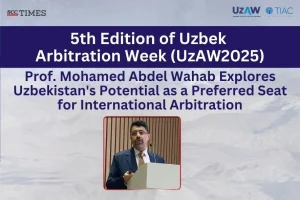The Chamber of Commerce and Industry of the Republic of Uzbekistan (‘CCI’) and the Tashkent International Arbitration Centre (‘TIAC’) have organized the 5th edition of the Uzbek Arbitration Week (‘UzAW’), i.e., UzAW 2025, which will take place from 23 to 26-09-2025 in Tashkent, Uzbekistan.
The keynote address was delivered by Prof. Mohamed Abdel Wahab, President of the Chartered Institute of Arbitrators (CIArb), Founding Partner at Zulficar & Partners Law Firm (Egypt), and Member of the Governing Board (ICCA).

Global Trends in International Arbitration
At the outset, Prof. Wahab spoke about the changes that had taken place in the last few years. Firstly, with the world becoming increasingly more divided, seats of arbitration have proliferated, and the number of arbitral institutions has increased. There are new institutions that do not have the requisite expertise in dispute resolution, but they possess the skill and the technical know-how in the use of AI.
Secondly, he stated that there was a degree of tension between the global, regional, and local principles due to the division and the fracture in the international legal order. For example, he highlighted how the Uzbek Courts have not set aside any arbitral award on public policy grounds. Regarding arbitral awards, he stated that when French, English, or European Courts refuse enforcement, it is seen as good, innovative, and cautious. However, when a developing jurisdiction does it, such a setting aside is viewed as a negative development. He remarked that this double standard should end; the judgment of whether an award ought to be set aside shall be a merit-based, objective assessment, and not based on who or which Court was setting it aside.
Furthermore, he stated that although international arbitration was increasingly coming under scrutiny due to challenges and the need for reforms, it would continue to co-exist with other non-ad hoc processes.
Coming to the third change, i.e., the disruptors, Prof. Wahab remarked that the first disruptor was the rise of international commercial courts, non-localized, permanent establishments, because arbitration had sometimes failed to deliver on time and cost, and had become quite rigid. The second disruptor was the Artificial Intelligence Dispute Resolution (‘AIDR’), which was going to co-exist when we arrive at a stage where there is artificial general intelligence, which would provide an AI-generated award at a fraction of the costs and time, as an alternative to a human-made award.
The last change, as per Prof. Wahab, was the rising geopolitical tensions, such as trade wars or sanctions, which arbitrators were grappling with, as many cases were cross-border disputes. However, he expressed his hope for humanity in overcoming such disputes.
Prof. Wahab’s ChatGPT Test on Uzbekistan’s Potential as a Preferred Seat for International Arbitration
Prof. Wahab also highlighted some facts such as Uzbekistan joining the Convention on the Recognition and Enforcement of Foreign Arbitral Awards, 1958 (‘New York Convention’), the ICSID Convention, 1965, and many CIS treaties. Additionally, with the enactment of the Law on International Commercial Arbitration, 2021, Uzbekistan has also adopted the UNCITRAL Model Law. He also shed light on the aspect of rich human resources, safety, its establishment as a regional hub, the cross-institutional framework with the Hong Kong International Arbitration Convention, etc., about Uzbekistan, which made it a good seat for arbitration.
Talking about the perceptions about Uzbekistan, Prof. Wahab stated that sometimes businesses were unaware of the region and the country. He recounted a test that he conducted with ChatGPT 5.0, wherein he asked whether Uzbekistan was a good seat for arbitration. This test revealed that Uzbekistan was not yet widely viewed as a top-tier global seat for international arbitration. Recent reforms in institution building had strengthened the case, but concerns about enforcement, experience, and political and regulatory risk still hindered international confidence. Noting that, though he had mentioned an international seat, ChatGPT mentioned a regional hub in its answer, and he remarked that this reflected the perception that the country could only be as good as a regional hub.
10 principles for a country to become a preferred seat for international arbitration
Prof. Wahab provided the following 10 principles that were required for a country to become a preferred seat for international arbitration:
-
Law: There shall be a clear, effective, and modern arbitration law that provides a necessary framework for facilitating fair and just resolution of disputes through arbitration, limited court intervention, and a struck and appropriate balance between confidentiality and appropriate transparency.
-
Judiciary: It shall be independent, competent with expertise in international arbitration, and efficient.
-
Legal Expertise: Uzbek counsels or arbitrators shall have expertise in international arbitration, English language capabilities, and provide significant choice for parties who seek representation in the Courts or arbitral proceedings.
-
Education: There shall be a commitment to the education of the counsel, arbitrators, judiciary, experts, users, and students about the character and autonomy of international arbitration and further development of learning in the field.
-
Right of Representation: Parties shall have a clear right to be represented in arbitral proceedings by counsel of choice or party representatives from inside or outside the seat.
-
Access and Safety: the seat shall be easily accessible and free from unreasonable constraints. It shall also have adequate safety and protection of the people, along with their information and documentation.
-
Facilities: there shall be functional facilities for the provision of services such as transcription, hearing rooms, document handling and management, and translation.
-
Ethics: the diversity of legal and cultural traditions shall be embraced, and international ethical principles governing the behaviour of arbitrators and counsel shall be adhered to.
-
Enforceability: There shall be adherence to international treaties and agreements governing and impacting the recognition and enforcement of foreign arbitration agreements, orders, and awards made at other seats.
-
Immunity: Arbitrators shall have a clear right to immunity from civil liability for anything done or omitted to be done by the arbitrator in good faith in the capacity as an arbitrator.
12 commandments that would position Uzbekistan as the preferred seat
In conclusion, Prof. Wahab provided following 12 commandments that would position Uzbekistan as the preferred seat:
-
Issue judicial practice directives for lower courts explaining the pro-arbitration statutory interpretation and enforcement of foreign awards
-
Establish a specialized arbitration chamber or circuit in higher courts to handle arbitration matters quickly and consistently.
-
Translate and publish leading Uzbek judgments of the Supreme Court into foreign languages and maintain an accessible database of arbitral jurisprudence and enforcement statistics, to showcase the competence and sophistication of Uzbek courts.
-
Improve and expedite enforcement proceedings.
-
Capitalize on Uzbekistan’s proximity to Europe, the Middle East, and other parts of Asia, and its leading edge in blockchain and crypto-assets technologies.
-
Establish cooperation and judicial dialogue programs with leading global institutions.
-
International arbitration should be a mandatory subject for undergraduate law students.
-
Continuing education and training for Uzbek practitioners to become international arbitrators, counsel, and support services.
-
Increasing accessibility to Uzbekistan by adopting a visa waiver for international arbitration seated in Uzbekistan.
-
Accentuate Uzbekistan’s technology and AI infrastructure and build state-of-the-art hearing facilities.
-
Market Uzbekistan for “arbitration tourism” as a go-to destination, and develop sector-specific initiatives for projects and disputes.
-
Offer relocation incentives to foreign arbitration practitioners and arbitrators.

